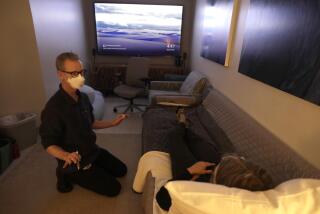New Rules Will Cost Dissidents at NIH
WASHINGTON — When a group of senior government scientists announced their opposition to new and restrictive conflict-of-interest rules at the National Institutes of Health last week, they complained that the agency’s mission was in danger of being irreparably compromised.
They said the new rules, which ban NIH employees from accepting consulting fees or stock options from biomedical companies, would victimize even food handlers and elevator operators.
But unmentioned in their prepared statement was another, more personal impact: One-third of the 18-member executive committee leading the dissidents has accepted consulting fees or stock options from biomedical companies in recent years, records show.
The fees totaled more than $400,000, according to the records. One committee member received stock options for 500,000 shares as compensation from a company.
The committee was elected by colleagues to “address the current situation” and the new rules, according to the Internet site of the protesting NIH employees, named the Assembly of Scientists.
Scientists at the NIH also are being ordered to divest ownership of stock in any pharmaceutical, biotechnology or related company. Other NIH employees, including the food handlers and elevator operators, must divest holdings exceeding $15,000 in value in any individual company in the biomedical field.
The tighter restrictions are scheduled to take effect Saturday. Nonetheless, NIH employees are at liberty to file formal comments in the hope of winning future changes.
When he announced the new rules Feb. 1, NIH Director Elias A. Zerhouni said that consulting payments from drug companies to staff scientists were a “systemic problem” that undermined confidence in the agency’s research.
Zerhouni said he was acting in response to reports published in the Los Angeles Times that became the focus of four congressional hearings last fall.
Citing interviews and agency and company records, The Times reported that senior NIH researchers and laboratory chiefs who helped design or oversee clinical trials had accepted industry compensation. The directors of two major NIH institutes — whose duties included overseeing clinical trials — accepted hundreds of thousands of dollars in fees or stock options.
At least 530 agency scientists accepted fees, stock or stock options from the biomedical companies between 1999 and 2003, according to the NIH and company documents. Other records, submitted to Congress last year by 20 biomedical companies and then vetted by Zerhouni’s aides, have identified about 50 NIH scientists who accepted industry payments but either failed to get required approvals from the agency or did not report the income internally.
The compensation from the companies to the scientists was allowed because many restrictions were lifted in November 1995 by a former NIH director, Dr. Harold E. Varmus.
The statement issued last week by the group of NIH scientists was the latest sign of resistance to tighter ethics rules among some staff members at the agency.
Four months ago, 180 staff scientists signed a letter to Zerhouni urging him not to embrace tougher rules that they say would render them “second-class citizens” by reducing their outside activities. Among those who signed the letter was Dr. H. Bryan Brewer Jr., who had helped draft national guidelines urging more aggressive use of drugs to lower cholesterol while collecting stock options and about $114,000 in consulting fees from companies making or developing cholesterol medicines.
Last March, about a dozen NIH scientists voiced opposition to tighter rules during public sessions of a blue-ribbon committee that was appointed by Zerhouni to evaluate the agency’s policies.
Among those who spoke in opposition was Dr. Lance A. Liotta, a laboratory chief at the National Cancer Institute. Interviews and government records would later show that Liotta — while leading the government’s collaboration with a Maryland company to develop a test for early detection of ovarian cancer — had accepted $70,000 in fees from a competitor firm. Liotta did so with the approval of his supervisors at the National Cancer Institute.
Government officials familiar with the matter said this week that the NIH had referred Liotta for investigation by the inspector general’s office of the U.S. Department of Health and Human Services. The inspector general has authority to subpoena documents and to question witnesses. It also may refer a matter for criminal prosecution to the Justice Department or to a local U.S. attorney’s office.
Liotta’s lawyer, Charles J. Morton Jr., said Wednesday: “We have not been informed of any such investigation . That being said, Dr. Liotta has and will continue to cooperate with any investigation relating to his outside activity.”
An unspecified number of other NIH employees who have taken fees or stock options from biomedical companies remain under internal review, officials said this week. Some, including Dr. P. Trey Sunderland III — an Alzheimer’s disease researcher who accepted fees totaling over $500,000 from drug industry giant Pfizer Inc. without seeking permission or reporting the income to the NIH as required — already have been referred to the inspector general.
In its prepared statement last week, the committee of dissident NIH scientists did not explicitly defend or condemn the acceptance of stock options or consulting fees from the drug industry. But the group said that Zerhouni’s sweeping conflict-of-interest restrictions generally would “discourage talented, innovative scientists from staying at or being recruited to the NIH.” The group also complained that the restrictions prohibited “nearly 40% of NIH employees,” along with their spouses, from holding stock in individual biomedical companies.
Interviews and financial-disclosure reports examined by The Times found that the following members of the committee accepted fees or stock options from industry in recent years, consistent with the then-existing rules:
Dr. William E. Paul, chief of the laboratory of immunology at the NIH’s National Institute of Allergy and Infectious Diseases. Paul from 2000 to early 2004 accepted a total of $380,000 in fees from Suntory Pharmaceuticals Research Lab and Novartis AG, plus $40,000 in travel expenses from Novartis.
The records show that Paul had agreed to remain a consultant with the two companies through 2011, with estimated total future fees of $470,000. Paul said Wednesday that he had won a temporary exemption from the NIH director’s office to continue consulting for Novartis through March 11, in order to complete an assignment for the company.
Paul said that he opposed the NIH’s new ban on compensation from the biomedical companies. He said that he favored case-by-case reviews, “by a knowledgeable group.”
Howard A. Young, a microbiologist and section chief in the National Cancer Institute’s laboratory of experimental immunology. Young received stock options for 500,000 shares from Advanced Viral Research Corp. from 2002 to 2003 to compensate him as a consultant.
In an interview, Young said he was “not planning to exercise any of the options.” Young said he opposed the ban on paid consulting with industry and favored case-by-case assessments. He said he resigned recently from Advanced Viral’s scientific advisory board.
Dr. Harvey J. Alter, a blood-transfusion specialist at the NIH Clinical Center, the world’s largest center for medical research on humans. Alter accepted $34,000 from six companies from 2001 to 2003.
Responding by e-mail, Alter declined to say whether he supported or opposed the ban on compensation from the companies.
Dr. Steven K. Libutti, a researcher and surgeon with the National Cancer Institute. Libutti accepted $21,000 in consulting fees from two biomedical companies, Peregrine Pharmaceuticals Inc. and Therapro Consulting, from 2003 to 2004.
Libutti said Wednesday that he was no longer a consultant to industry. Asked if he supported the NIH’s ban on all consulting income from the biomedical industry, Libutti said he preferred case-by-case assessments. “Each case is unique,” he said.
Earl R. Stadtman, a biochemist with the National Heart, Lung and Blood Institute. He was a scientific advisor to Centaur Pharmaceuticals Inc. as recently as May 2000, according to a financial report the company filed with the Securities and Exchange Commission. NIH records show that Stadtman received $8,000 in consulting fees from Centaur and the Burroughs Wellcome Fund from 1995 through 1999.
Stadtman said that he lacked permission from the agency to answer questions for this article.
Dr. Cynthia E. Dunbar, a hematologist with the National Heart, Lung, and Blood Institute. In 2003, Dunbar received consulting-related compensation of $1,370 from MolMed, an Italy-based biotechnology company, and was to have remained an occasional, paid consultant to the company.
Dunbar said she had done nothing for MolMed since 2003, adding: “I personally support the global consulting ban as at this point necessary, but in my role on the [executive] committee we are working to come to a consensus on this issue.”
In an in e-mail distributed to NIH employees on Tuesday, a deputy agency director, Dr. Raynard S. Kington, said that by Saturday, “you must stop prohibited outside activities.” Meanwhile, the executive committee members of the Assembly of Scientists were to meet late Wednesday to plan their next moves.
“A lot of us feel this has stretched [restrictions] too far,” said Young, one of the committee members.
Times researcher Janet Lundblad in Los Angeles contributed to this report.
More to Read
Start your day right
Sign up for Essential California for news, features and recommendations from the L.A. Times and beyond in your inbox six days a week.
You may occasionally receive promotional content from the Los Angeles Times.







